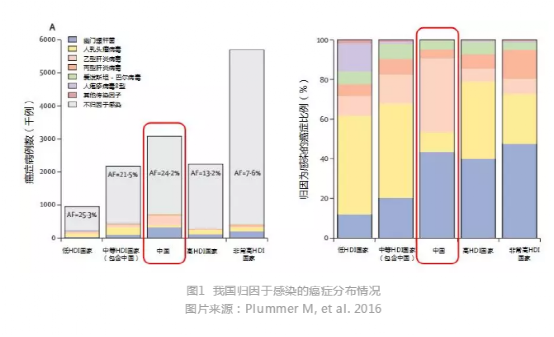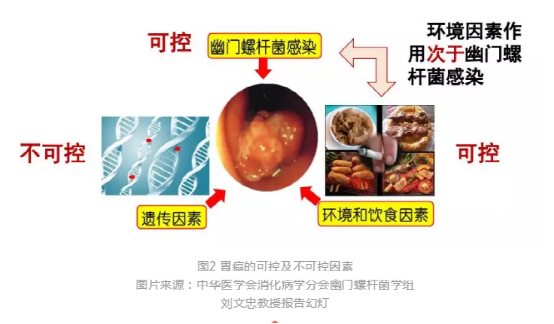201The latest 8 years of cancer data show that the incidence and mortality of gastric cancer in China ranks second in malignant tumors, while the number of new cases and deaths of gastric cancer in China accounted for respectively With 44.1% and 49.8% of the global total1, reducing the incidence and mortality of gastric cancer has become a major public health problem to be solved urgently2. Among the measures to prevent gastric cancer, the eradication of Helicobacter pylori (Hp) is the primary measure.
1, Hp infection is one of the main causes of gastric cancer
In 1994, the International Agency for Research on Cancer (IARC) listed Hp as a class I carcinogen, and it has been confirmed that Hp infection is chronic non-atrophic gastritis → atrophic gastritis → intestinal epithelium Metaplasia→dysplasia→gastric cancer is the initiating factor of the evolution process3. A meta-analysis showed that Hp infection can increase the risk of gastric cancer by a factor of two, while another prospective study found that 2.9% of Hp-positive patients eventually progressed to gastric cancer, while none of Hp-negative patients developed gastric cancer4.
An authoritative data in 2016 shows that among all the cancer burdens attributed to infection, Hp infection ranks first, and my country’s cancer burden attributed to infections accounted for 24.2 %, of which the burden of cancer (including gastric cancer) attributable to Hp infection is as high as 42% (Figure 1)5.

2, Hp Infection is the most important and controllable risk factor for gastric cancer< /strong>
A large amount of research evidence shows that the occurrence of intestinal gastric cancer (which accounts for the majority of gastric cancer) is the result of Hp infection, environmental factors and genetic factors (Figure 2). It is estimated that about 90% of the occurrence of non-cardia gastric cancer is related to Hp infection; the overall role of environmental factors in the occurrence of gastric cancer is inferior to Hp infection; genetic factors play a decisive role in the occurrence of about 1% to 3% of hereditary diffuse gastric cancer effect. Therefore, Hp infection is currently the most important and controllable risk factor for the prevention of gastric cancer.

3. Eradication of Hp can effectively reduce the risk of gastric cancer strong>
Confirmed by multiple studies , Eradication of Hp can eliminate or reduce the risk of gastric cancer7. A 15-year follow-up multi-factor intervention trial conducted in Linqu County, Shandong Province, a high-incidence area of gastric cancer in my country, showed that Hp eradication can effectively reduce the occurrence of chronic atrophic gastritis, intestinal metaplasia, dysplasia and other precancerous lesions and gastric cancer. The risk of disease and gastric cancer is reduced by 39%8. The latest data from a Hong Kong study covering 73237 patients with Hp eradication followed up for more than ten years showed that only 0.27% of those infected with Hp eradication treatment developed gastric cancer, which is a 50% reduction in gastric cancer risk compared to those without Hp eradication treatment. And this result is also applicable to elderly patients over 60 years old (Figure 3)9.
Hp eradication cannot eliminate the risk of gastric cancer in patients with gastric mucosal atrophy and/or intestinal metaplasia, but for high-risk patients, such as patients with early gastric cancer, After successful removal of early gastric tumors under endoscopy, eradication of Hp can also reduce the risk of metachronous gastric cancer by 2/37.


